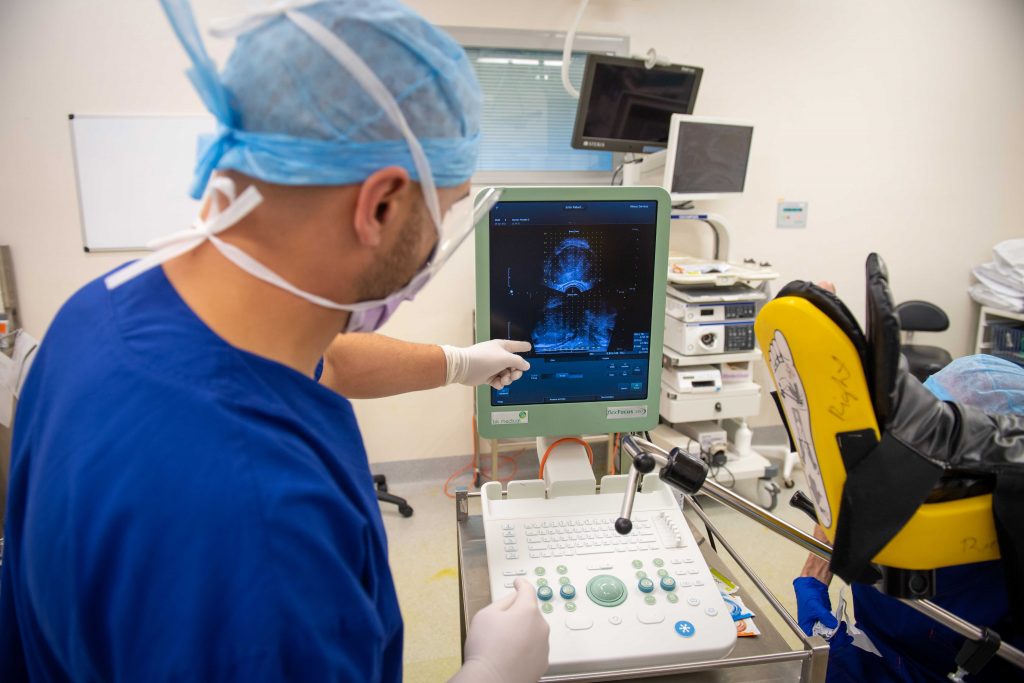Prostate enlargement, otherwise known as benign prostate hyperplasia (BPH) is a non-cancerous enlargement of the prostate. Prostate enlargement affects around 50% of men over the age of 50.

Symptoms of prostate enlargement:
Some men with prostate enlargement develop uncomfortable urinary symptoms, which can impact on their quality of life. These symptoms may include:
- Increased frequency or urgency to urinate
- Difficult when beginning to urinate
- Weak urine stream, or a urine stream that stops and starts
- Increased urge to urinate at night, which disrupts sleep patterns
- Inability to completely empty the bladder
- Dribbling at the end of urination.
Complications associated with untreated prostate enlargement:
Left untreated, prostate enlargement can lead to complications such as:
- Urinary tract infection (which in men, always requires evaluation)
- Sepsis (blood poisoning), due to urinary tract infection
- Haematuria (blood in the urine)
- Kidney failure due to high pressure of retention of urine
- Bladder stones
- Permanent bladder damage.
Treatment options for prostate enlargement:
Treatment for prostate enlargement varies from patient to patient, depending on the individual circumstances of the patient.
At Melbourne Urology Centre, our specialist urologists are experts in the treatment of prostate enlargement. We offer the full range of world-class surgical and medical treatments of BPH.
Medical treatment for prostate enlargement
Medical treatment for prostate enlargement involves the use of particular medications. Some of these medications work by relaxing the muscles in the bladder and prostate, whereas others work to slow, reduce the growth, or shrink the size of the prostate.
Alpha blockers (Prazosin, Tamulosin, Silodosin)
These medications relax the muscles in the bladder and prostate, making it easier to urinate.
- May provide symptomatic relief, doesn’t treat the underlying cause
- Does not change the natural progress of the disease
- Side effects may include: dizziness/low blood pressure, fatigue, retrograde ejaculation (sexual dysfunction)
5A-reductase inhibitors (Dutasteride, Finasteride)
These medications alter the production of the sex hormones that cause the prostate to grow. In some cases, 5A-reductase inhibitor medications are able to shrink the prostate.
- Can reduce the size of the prostate by around 25% over the course of 6-9 months
- May improve symptoms and may reduce the need for surgery
- Up to 10% of men experience decreased libido (sex drive) and erectile dysfunction; this may be permanent
Combination therapy (Duodart)
This is a combination medication that is more effective in treating prostate enlargement, than either of the other two types alone. The drug contains tamulosin and dutasteride. Maximal effort for this medication is often observed at around 6-9 months. There is a combined side-effect profile of both medications.
Minimally invasive procedures for the treatment of prostate enlargement
Rezum Therapy
Rezum therapy is a treatment for prostate enlargement that uses water vapour (steam) to deliver energy to the enlarged tissue, causing the body to absorb the obstructing tissue and hence create a more open channel for the urine to flow through. There are no incisions involved in performing Rezum therapy.
Urolift System
Urolift can be an option for men who do wish to avoid medical treatment or more invasive surgical treatment for prostate enlargement. In this procedure, the obstructing tissue is lifted out of the way, creating a more open channel for urine to flow through.
Surgical treatment for prostate enlargement
There are several options for surgical treatment of prostate enlargement. Your urologist will be able to discuss these in detail with you. You may find more information on these surgical procedures by searching under the ‘Procedures’ tab on our website.
Surgical treatment options for prostate enlargement include:
- TURP (transurethral resection of prostate)
- HoLEP (holmium laser enucleation of the prostate)
- Greenlight laser ablation of the prostate
- Robotic simple prostatectomy (da Vinci robot)
References:
Edwards, J. L., (2008), Diagnosis and management of benign prostatic hyperplasia, American Family Physician, 77(10),[https://www.aafp.org/afp/2008/0515/p1403.html], accessed 02/15/2022
National Institute of Diabetes and Digestive and Kidney Diseases, (2014), Prostate Enlargement (Benign Prostatic Hyperplasia),https://www.niddk.nih.gov/health-information/urologic-diseases/prostate-problems/prostate-enlargement-benign-prostatic-hyperplasia], accessed 02/15/2022.
Neotract Inc., (2019), UroLift System,https://urolift.com.au/urolift-system/], accessed 02/15/2022.
